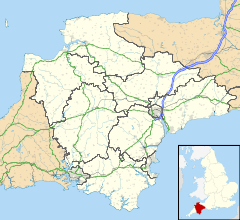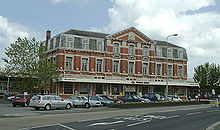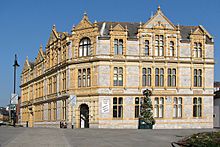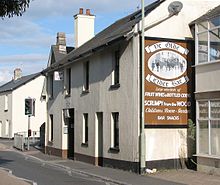- Newton Abbot
-
You may be looking for Newton Abbot (UK Parliament constituency)
Coordinates: 50°32′25″N 3°36′31″W / 50.5403°N 3.6087°W
Newton Abbot 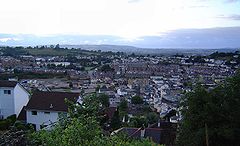
View over central Newton Abbot taken from Wolborough Hill, July 2005
 Newton Abbot shown within Devon
Newton Abbot shown within DevonPopulation 23,580 (2001) OS grid reference SX860713 Parish Newton Abbot District Teignbridge Shire county Devon Region South West Country England Sovereign state United Kingdom Post town NEWTON ABBOT Postcode district TQ12 Dialling code 01626 Police Devon and Cornwall Fire Devon and Somerset Ambulance South Western EU Parliament South West England UK Parliament Newton Abbot List of places: UK • England • Devon Newton Abbot is a market town and civil parish in the Teignbridge District of Devon, England on the River Teign, with a population of 23,580.[1]
Newton Abbot has a racecourse nearby situated in the parishes of Kingsteignton and Teigngrace and has one country park, Decoy. Newton Abbot's holds the historic Cheese and Onion Fayre, originally held from the 5th to 7 November in honour of Saint Leonard, but now celebrated at the beginning of September. The town grew very rapidly in the Victorian era as it was home to the South Devon Railway locomotive works. This later became a major steam engine shed and was retained to service British Railways diesel locomotives, although it closed in 1981 and is now the site of an industrial estate.
Contents
History
Early history
Traces of Neolithic people have been found at Berry's Wood Hill Fort near Bradley Manor. This was a contour hill fort that enclosed about 11 acres (4.5 ha). Milber Down camp was built in the 1st century BC. Later it was occupied by the Romans—coins and a pavement have been found.
There are remains of a Norman motte-and-bailey castle on Highweek Hill. This was probably a lookout post to watch people coming up the Teign estuary. A village grew up around this castle which over the years became Highweek — the village on the high ground. On the low ground around the River Lemon arose another settlement which became part of Wolborough Manor.
The markets
The New Town of the Abbots (of Torre Abbey) was given the right to hold a weekly market on Wednesdays sometime between 1247 and 1251. By 1300 the two settlements were renamed as Newton Abbot (taking the low ground) and Newton Bushel (taking the high ground). On the strength of the market it quickly became a successful thriving town and a good source of income for the Abbots.
Over the river on the Highweek side another weekly market was created. This one ran on Tuesdays and, because the Bushel family were the landowners this community, became known as Newton Bushel. Over the next 200 years Newton Bushel ran more annual fairs, a number of mills were set up and the leather and wool trades started. Newton Bushel was also a convenient place for travellers to stay. Torre Abbey was dissolved in 1539 and ownership of Wolborough was granted to John Gaverock who built himself a new house at Forde.
The twin markets of Newton Abbot and Newton Bushel continued until they were merged together in 1633 as a Wednesday weekly market under the ownership of Bradley Manor. By 1751 there was also a smaller Saturday market and three annual fairs—a cattle fair on June 24, a cheese and onion fair in September and a cloth fair on 6 November. The markets continued to expand so in 1826 a new market was built. Over the next 50 years the buildings became dilapidated so a substantial new market was built in 1871. The buildings included a pannier market, a corn exchange and a public hall—the Alexandra (now a cinema). The river Lemon was also covered over. Further enlargement took place in 1938 as a new cattle market and corn exchange were built. There has been a thriving market in Newton Abbot for over 750 years.
Wool and leather
In medieval times Devon was an important sheep rearing county. Many towns had their own wool and cloth industries and Newton Abbot had woollen mills, fullers, dyers, spinners, weavers and tailors. In particular, fellmongering (where wool is removed from the sheepskin) was well established in the town. In 1724 Daniel Defoe wrote that Newton Abbot had a thriving serge industry that sent goods to Holland via Exeter. The annual cloth fair was the town’s busiest fair. Over the 19th century Vicary’s mills became an important employer in the town and by the 1920s they employed over 400 men. However, by 1972 business had declined and the works finally closed down.
Associated with the woollen industry was the leather one. The hides left after the fellmongering process were made into leather. Tanners, boot and shoe makers, glovers and saddlers were all in business in Newton Abbot. As with the wool industry business flourished over 600 years until after the Second World War.
The Newfoundland Trade
In 1583 Humphrey Gilbert, a local adventurer, landed at St. John’s in Newfoundland and claimed the area as a British colony. The fisheries quickly developed. Between 1600 and 1850 there was a steady trade between Newton Abbot and the cod fisheries off Newfoundland. Every year men from the town would gather at the Dartmouth Inn or Newfoundland Inn in East Street in the hope of being hired for a season’s work. In the autumn the dried cod was stored in depots and sometimes used as payment. There was considerable economic spin-off from this trade. Fish hooks, knives, waterproof boots and rope were all made in the town. The Rope Walk to be found in East Street just a few yards from the Cider Bar still exists, together with the names of Newfoundland Way and St John’s Street.
Ball clay and the Stover Canal
Just 2 miles (3.2 km) northwest of Newton Abbot lie the large ball clay workings of the Bovey basin. The main workings are on the eastern outcrop of the deposits at Kingsteignton, which can lay claim to being the centre of Britain's ball clay industry. The Bovey Basin took millions of years to fill from rivers that flowed out of Dartmoor. The sediments included clay derived from the decomposed granite. The natural deposition has resulted in a clay that is purer and more refined than many others. Clay is used in a wide range of products such as bricks, tyres, porcelain, glossy magazines, medicines and toothpaste.
Kingsteignton clay was being used to make pipes around 1680. By 1700, it was being shipped from Teignmouth, and its utilisation by the famous potter Josiah Wedgwood made it a success. The clay was extracted by simply digging out the lumps on courses—rather like peat cutting. The bulky clay was transported by packhorse to Hackney Quay at Kingsteignton where it was loaded on to barges for shipment down the Teign Estuary where it was transferred to small ships bound for Liverpool and other ports.
Towards the end of the 18th century, the ball clay industry was steadily expanding. A local landowner, James Templer, built the Stover Canal in 1792 to help ship clay along the canal and Teign Estuary from the Bovey Basin to the port of Teignmouth. Coal, manure and agricultural produce was also freighted along the canal. James Templer's father, also called James Templer, purchased the 80,000-acre (320 km2) Stover Estate near Newton Abbot in 1765. Granite from Hay Tor was used to build Stover House which was completed by 1792. By 1820 a granite tramway, which had rails cut from granite, was opened connecting the granite quarries of Haytor to the canal. This enabled large quantities of granite to be transported for major works like the new London Bridge which opened in 1825. George Templer, son of James Templer (the second) and brother of Rev. John Templer, rector of Teigngrace, Devon, overspent his resources and was forced to sell Stover House, Stover Canal, the Haytor Granite Tramway and most of the rest of the family's considerable estates to Edward St Maur, 11th Duke of Somerset, in 1829. The canal was extended to cope with this, and the industry fared well until 1858 when they were out-competed by the more economic Cornish coastal quarries. The Stover canal reverted back to shipping ball clay—which only really stopped by 1939.
The ball clay industry is now highly mechanised and very successful. The majority of the clay is now transported by road and transferred to ships at the nearby port of Teignmouth.
The Stover Canal Society was formed following a public meeting held in February 1999. The aims of the society are to preserve and restore the canal. Railtrack who owned most of the canal transferred ownership in 2005 for the sum of £1, to Teignbridge District Council for leisure use by the community. Work parties have made a start on clearing the canal to asses what further work is needed.
The railway
Newton Abbot railway station is situated at the east end of Queen Street. It is served by both local and long distance services.
The South Devon railway reached Newton Abbot in 1846 and changed the town from being just a market town with associated trades (leather and wool) to become a base for industry. The station was opened by the South Devon Railway Company on 30 December 1846. A branch to Torquay was added on 18 December 1848 and one to Moretonhampstead on 26 June 1866, although the latter has since closed to passengers. Isambard Kingdom Brunel used the Teignmouth / Newton Abbot section to experiment with his atmospheric railway. The experiment failed but the remains of pumping house buildings still survive at Starcross and the old Dairy Crest milk processing factory in Totnes. In 1876 the Great Western Railway bought up the railways and developed the repair and maintenance sheds into a substantial works that employed over 600 people to start with but by 1930 over 1,000 men were involved.[citation needed] Extensive sidings were also built making a large marshalling yard. The present station was rebuilt to its current form in 1926. The large clock was gifted by the people of the town.
Many other industries were set up beside the railway station—a timber yard, iron and brass foundries, engineering works. The town’s population increased from 1,623 in 1801 to 12,518 by 1901. Terraced streets were built to house the workers and attractively styled villas sprang up around the town for the wealthier professionals and retired people.
Recent history
The town was bombed twice in air raids during World War II, killing a total of 21. There was a severe flood on 27 December 1979, the latest in a long series, when the River Lemon burst its banks after prolonged rain.
Tucked into a corner of the racecourse, Newton Abbot's stock car track flourished for nearly 30 years, and attracted fans and drivers from all over the South of England. A short 300-metre oval track, it featured races for the cars of the BriSCA organization, as well as saloons and "bangers", under the promotion of ex-speedway rider Trevor Redmond.
Hospital
A new hospital has been built at the end of Jetty Marsh Road, which was completed in the spring of 2009. Some controversy surrounds the siting of this hospital on top of land which contains old mine shafts. It is also sited near the river Teign floodplain which suffered serious flooding during the wet winter of 2000. The hospital opened on Monday the 12th of January following much debate in the press about the lack of parking spaces for patients and staff. Many staff were unable to receive a permit for the new hospital which is not situated near any of the towns car parks.
Education
Coombeshead College is a comprehensive school, located on Coombeshead Road. The school is a Trust School and a specialist media and arts college. The school educates around 1442 students. aged between 11 to 18.
Newton Abbot College is a comprehensive school, located on Old Exeter Road, that was established on 1 September 2008 by the renaming of Knowles Hill School.[2] The school, a specialist Technology College, educates around 1,200 pupils, aged 11 to18.[3]
Primary schools include Decoy Primary School which has around 445 pupils and has been awarded the Becta ICT Mark, Eco and Healthy School awards, the Devon Active Schools award and a platinum award for its travel plan.[4]
Landmarks
Alexandra Theatre (cinema)
The Alexandra was built in 1871.
Originally it was built as a corn exchange at the end of the market building. However, before it was finished it was decided instead to use the space as a meeting hall for the community. It was called the Alexandra Hall and continued to be used for this purpose until in 1883 a major upgrade of the building took place which included the addition of a stage with dressing rooms below, more dressing rooms in extensions at the side of the main building and an orchestra pit.
The stage area was constructed by incorporating part of the adjoining Market Hall and building a full-height brick wall which separated the stage from the Market. As the Market building was higher than the Alexandra, the stage area had the added advantage of a built-in fly tower which enabled the 'flying' of backdrops - an essential feature of any theatre worthy of the name.
The Theatre was used by touring companies for plays and pantomimes and by the local Operatic Society for their musical productions. The auditorium had a flat floor, occasionally used as a roller skating rink, and the building was heated with open fires.
In the early years of the 20th century moving picture shows were a regular feature of the theatre's schedule and eventually the 'movies' took over from the now decreasing stage shows. The next major alteration to the theatre took place in 1928 when fixed, raked seating was fitted in the stalls and the addition of a balcony again with raked seating. In those days the Theatre had a full time orchestra and even a doorman on duty.
Cinema projectors were installed as a permanent feature and this now provided the main income for the Theatre.
Another refurbishment took place in 1978 when, as part of the town centre redevelopment scheme, a new foyer was built at the rear of the stalls area and the seating was reduced from 515 to 365 seats. New seats were fitted and the orchestra pit – which had for many years been covered over – was re-instated. The dressing rooms were also re-fitted with new washbasins and lighting and on stage the wooden steps to the fly-bridge were replaced with steel ladders.
New dressing rooms were built just off the stage together with a new entrance to the stage area which had the effect of increasing the off stage area, or 'wings', by about 50%.
In 1995 the theatre was once again altered into a two screen cinema by separating the balcony area with an acoustic wall. This means that the stalls area only is now used for live stage performances and that the number of seats available for stage shows is down to 177.
St Leonard's Tower
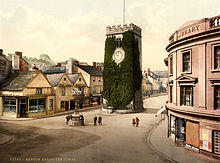 Photochrom of St Leonard's Tower, 1895
Photochrom of St Leonard's Tower, 1895
The centre of the town features the ancient tower of St Leonard. The tower is all that remains of the medieval chapel of St Leonard, founded in 1220 and first referred to in 1350 in a document of the Bishop de Grandisson of Exeter, the main chapel being demolished in 1836. Adjacent to the tower is a plaque marking the spot where the first declaration of the newly arrived William III, Prince of Orange was read in 1688. It reads "The first declaration of William, Prince of Orange, the glorious defender of the Protestant Religion and the liberties of England, was read on this pedestal by the Rev John Reynall, Rector of this parish, on November 5th 1688." Although William arrived in Brixham on 5 November he did not reach Newton Abbot until the 6th November when he stayed overnight in the town at Forde House as he made his way to London to assume the English throne.
Forde House
Forde House (now known as Old Forde House) is situated in the southeast corner of the town. The present house was built in 1610 by Richard Reynell (who later became Sir Richard Reynell) and his wife Lucy. The house was built with an E-shaped floor plan, which is thought to be in honour of Queen Elizabeth I, who had recently died. The grounds were originally quite extensive, and included the whole of what is called Decoy (so named, because wildfowl were decoyed there to extend the house's larder), as well as a deer park.
In 1625 King Charles I stayed at the house overnight on his way to inspect the fleet at Plymouth. He returned a few days later and stayed for a further two nights.
Forde House gave shelter to Oliver Cromwell and Colonel Fairfax while on their way to besiege Royalist Dartmouth in 1646.
In 1648 the estate passed onto the Courtenay family via the marriage of Margaret (the only daughter of Jane Reynell and Sir William Waller) to Sir William Courtenay, who was the lord of nearby Powderham Castle.
William of Orange stayed at the house in 1688 on the way to his coronation in London, having landed in Brixham a few days earlier. The house remained the main residence of a succession of Courtenays until 1762 when the house was let to a succession of occupiers.
The Courtenay family sold the house in 1936 to Mr Stephen Simpson, who sold it two years later to Mrs M Sellick. Teignbridge District Council bought the house in 1978 and remain the current owners. It has been refurbished by the Council and is now used as office and conference space as well as being used for weddings and other events.
Bradley Manor
At the opposite end of Newton Abbot is the National Trust property, Bradley Manor. This is a 15th century (circa 1420) manor house in its own secluded woodland setting, with a notable great hall emblazoned with the royal coat of arms of Elizabeth I.
The Passmore Edwards Public Library
John Passmore Edwards originally wanted to have a hospital built for the town in memory of his mother, who was born there. However as the town already had a hospital, he decided on a public library, which was opened in 1904. The building is one of the most impressive in Newton Abbot, and originally housed both the library and a Science, Art and Technical School (which the Council wanted to include). The building was designed by the Cornish architect Silvanus Trevail.[5] The style is elaborate Renaissance, and much use is made of yellow terracotta mouldings over the windows and doorways. Passmore Edwards donated £2,500, while the County Council and a public subscription paid for the rest of the building. The library has currently moved to Teign House while it is being refurbished.
Almshouses
There are several sets of almshouses in Newton Abbot.
- Gilberd’s in Exeter Road were endowed in 1538 by John Gilberd of Compton Castle to house lepers. There were five houses and they reputedly had sloping floors to help in washing out the houses. Eight modern apartments with a common room and visitors bedroom now occupy the site, which is administered by the Feoffees of Highweek.
- In 1576 Robert Hayman set up a number of houses for poor people in East Street. These were rebuilt in 1845 and can still be seen opposite the entrance to Newton Abbot hospital.
- Reynell’s almshouses were originally built in 1640 beside Torquay Road to house four clergy widows (‘the relicts of preaching ministers, left poor, without a house of their own’)
- Mackrell’s almshouses in Totnes Road were built in 1874. Mackrell was a native of Newton Abbot who made his fortune as a chemist in Barnstaple. Mackrell also funded a home in the Forde Park area for the "fallen women of Newton Abbot", which housed single mothers fallen on hard times.
The Workhouse
The original Newton Abbot poorhouse was based in East Street, and the cellar of the Devon Arms was used as the oakum picking room—where paupers were assigned the unpleasant job of untwisting old rope to provide oakum, used to seal the seams of wooden boats. Newton Bushel had its own poorhouse, not far from present day Dyrons.
The 1834 Poor Law Act required changes and incorporation, so in 1839, a new workhouse was built in East Street and was used to house paupers from the surrounding areas. Over time, the workhouse became more of a hospital for the sick, infirm, and aged poor. By 1890 there were nearly 400 inmates, and reports of cruel treatment. A new infirmary was built, and during the wars some of the buildings were used as a military hospital. By 1950, the workhouse buildings were incorporated into the (now empty) hospital in East Street.
Tucker's Maltings
Close to the railway station is Tucker's Maltings, the only traditional malthouse in the UK open to the public. The malthouse—which offers the visitor hour-long guided tours, from the barley to beer discovery centre—produces malt for over 30 breweries, and enough to brew 15 million pints of beer per annum. In April every year, the maltings hosts a three-day beer festival where over 200 different real ales can be sampled.
Ye Olde Cider Bar
Said to be one of only two remaining cider houses in the United Kingdom,[6] Ye Olde Cider Bar in East Street sells only cider, perry, country wines and soft drinks. Its interior and the simple wooden furniture have remained relatively unchanged for over thirty years. However some of the old customs associated with the bar such as limiting women and holiday makers to half pint measures and covering the floor with sawdust have now gone.
Newton Abbot Town & G.W.R. Museum
A small museum adjacent to the Town Hall details the history of Newton Abbot and of the Great Western Railway.
Notable people
- John Dynham, Ist Baron Dynham ( died 1501 ) a leading royal councillor to three kings was a native of Newton Abott
- Robert Hayman, poet, and governor of Newfoundland, born in Wolborough (now part of Newton Abbot) in 1575.
- John Lethbridge, who invented a diving salvage machine in 1715.
- Lewis Tessier, merchant and political figure in Newfoundland, born here in 1820.
- William Knox D'Arcy, a founder of the petrochemical industry in Persia, born here in 1849.
- Frank Matcham, the theatrical architect, born here in 1854.
- General Sir Leslie Rundle, a British Army General in World War I, born here in 1856.
- Frank Harry, first-class cricketer, born here in 1876.
- Ivy Williams, the first woman to be called to the English bar, born here in 1877.
- Fred Thompson, writer and librettist was born in London in 1884, but raised here.
- Sir Samuel White Baker, explorer, big-game hunter, writer and abolitionist, bought the Sandford Orleigh estate in 1874, and died there in 1893. Baker's Park in the south west of the town is named after him.[7]
- Oliver Heaviside, the physicist, lived here from 1897 to 1909.
- Edith Mayne, freestyle swimmer, born here in 1905.
- Norah Baring, movie actress, born here in 1907.
- Don Bird, professional footballer, born here in 1908.
- Robert Cyril Layton Perkins (1866–1955), entomologist, retired here in 1912.
- Len Coldwell, cricketer, born here in 1933.
- David Vine, TV sports presenter, born here in 1935.
- John Wilcox, cricketer, born here in 1940.
- Anthea Redfern, former television hostess, born here in 1948.
- Hiley Edwards, cricketer who played for and captained Devon.
- Peter Truscott, Baron Truscott, peer, petroleum and mining consultant, and writer, born here in 1959.
- Sergio Pizzorno, guitarist and songwriter with band Kasabian, born here in 1980.
- Guy Hendrix Dyas, designer and feature film production designer, raised here in the 1980s[citation needed]
- Chris Metters, cricketer, played for South Devon CC and currently signed for Warwickshire County Cricket Club
See also
References
- ^ "Parish Headcounts". Neighbourhood Statistics. The Office for National Statistics. 2001-04-01. http://neighbourhood.statistics.gov.uk/dissemination/LeadTableView.do?a=3&b=793775&c=Newton+Abbot&d=16&e=15&g=437376&i=1001x1003x1004&m=0&enc=1&dsFamilyId=779. Retrieved 2008-12-20.
- ^ "Students make history as GCSE passes roll in", Herald Express, 22 August 2008
- ^ "Knowles Hill School - Inspection Report", Ofsted, 27 February 2008
- ^ Offsted report 29th November 2007
- ^ Bridget Cherry & Nikolaus Pevsner (1989). The Buildings of England: Devon. Harmondsworth: Penguin. p. 591. ISBN 0140710507.
- ^ Ye Olde Cider bar at Scrumpyandwestern
- ^ Unsworth, Harry (1993). A New Look at Old Newton Abbot. Coffinswell, Devon: Mike Bateson Publishing. p. 79. ISBN 0-9521689-0-1.
- Roger Jones (1986). A Book of Newton Abbot. Bradford on Avon, Wiltshire: Ex Libris Press. ISBN 0 948578 06 8.
- Derek Beavis (1985). Newton Abbot, The Story of the Town's Past. Buckingham: Barracuda Books. ISBN 0 86023 236 0.
- W. G. Hoskins (1954). A New Survey of England - Devon. London: Collins. pp. 441–443.
- Mary O'Hagan (1990). A History of Forde House. Frome, Somerset: Butler & Tanner Ltd.
External links
Ceremonial county of Devon Unitary authorities Boroughs or districts Major settlements - Ashburton
- Axminster
- Barnstaple
- Bideford
- Bovey Tracey
- Bradninch
- Brixham
- Buckfastleigh
- Budleigh Salterton
- Chagford
- Chudleigh
- Chulmleigh
- Colyton
- Crediton
- Cullompton
- Dartmouth
- Dawlish
- Exeter
- Exmouth
- Great Torrington
- Hartland
- Hatherleigh
- Holsworthy
- Honiton
- Ilfracombe
- Ivybridge
- Kingsbridge
- Kingsteignton
- Lynton
- Modbury
- Moretonhampstead
- Newton Abbot
- North Tawton
- Northam
- Okehampton
- Ottery St Mary
- Paignton
- Plymouth
- Plympton
- Princetown
- Salcombe
- Seaton
- Sidmouth
- South Molton
- Tavistock
- Teignmouth
- Tiverton
- Torquay
- Totnes
See also: List of civil parishes in Devon
Rivers Topics - Devon County Council
- Economy
- Flag
- History
- Notable people
- Dartmoor
- Exmoor
- Jurassic Coast
- Towns by population
- South West Coast Path
- Museums
Categories:- Market towns in Devon
- Railway towns in England
- Towns in Devon
Wikimedia Foundation. 2010.

